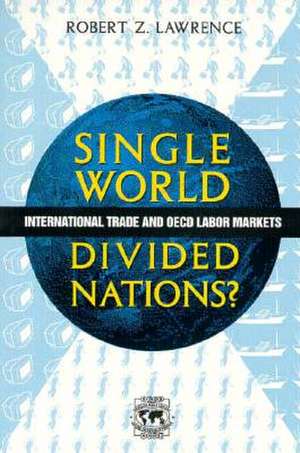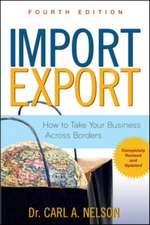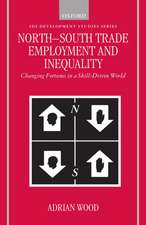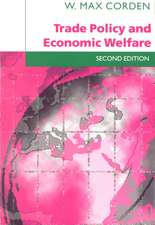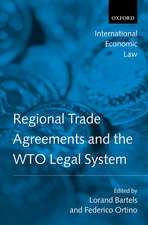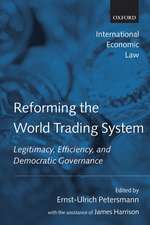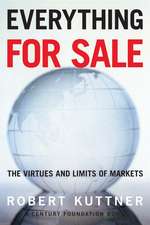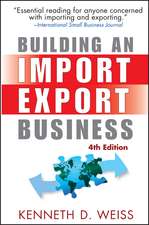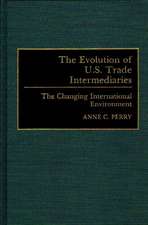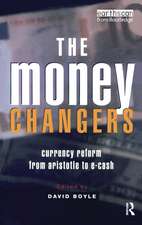Single World, Divided Nations?: International Trade and the OECD Labor Markets
Autor Robert Z. Lawrenceen Limba Engleză Paperback – sep 1996
The world economy has undergone miraculous changes in the last decade, particularly in developing and former communist countries. Privatization and trade liberalization have replaced the protectionist and statist policies that were deeply entrenched in these areas just ten years ago. Today, these dynamic emerging markets offer attractive opportunities. According to Robert Lawrence, liberal international trade and investment should provide significant opportunities for gains in developing and developed nations alike.
But will the developed countries be allowed to keep their markets open and absorb exports from developing countries? Many in the U.S. and Europe blame international trade for unemployment and wage inequality. But what is the real relationship? Lawrence contends that while trade has played some role in reducing the wages of poorly educated workers in the U.S. and in raising the unemployment of unskilled workers in Europe, its impact has been small compared with other causes of these changes.
Lawrence examines the role of trade in developed and developing countries and its impact on labor markets and wage inequality, and discusses what he considers the more important effects of technological and organizational change. He begins by focusing on U.S. wage behavior, then moves to wage behavior in the OECD countries.
Lawrence concludes that the impact of globalization on OECD labor markets has been far less damaging than many have argued and, indeed, that international trade enhances national welfare. He presents considerable evidence that the sources of poor labor market performance are essentially domestic—they reflect ongoing technological and organizational shocks that would be present even if the economy was closed. This evidence suggests that international differences in wage rates and labor standards are not major factors in OECD labor market behavior. He explains that the major challenges to policy are educating the public on the nature of these changes, emphasizing the need for worker training and education to take advantage of new technologies and new organizational structures, and developing measures to reduce earnings inequality while preserving and increasing wage flexibility.
Robert Z. Lawrence is professor of international trade and investment at the John F. Kennedy School of Government at Harvard University. His previous books include A Vision for the World Economy: Openness, Diversity, and Cohesion (Brookings, 1996), the capstone volume to the Integrating National Economies series.
Copublished with the OECD Development Centre
But will the developed countries be allowed to keep their markets open and absorb exports from developing countries? Many in the U.S. and Europe blame international trade for unemployment and wage inequality. But what is the real relationship? Lawrence contends that while trade has played some role in reducing the wages of poorly educated workers in the U.S. and in raising the unemployment of unskilled workers in Europe, its impact has been small compared with other causes of these changes.
Lawrence examines the role of trade in developed and developing countries and its impact on labor markets and wage inequality, and discusses what he considers the more important effects of technological and organizational change. He begins by focusing on U.S. wage behavior, then moves to wage behavior in the OECD countries.
Lawrence concludes that the impact of globalization on OECD labor markets has been far less damaging than many have argued and, indeed, that international trade enhances national welfare. He presents considerable evidence that the sources of poor labor market performance are essentially domestic—they reflect ongoing technological and organizational shocks that would be present even if the economy was closed. This evidence suggests that international differences in wage rates and labor standards are not major factors in OECD labor market behavior. He explains that the major challenges to policy are educating the public on the nature of these changes, emphasizing the need for worker training and education to take advantage of new technologies and new organizational structures, and developing measures to reduce earnings inequality while preserving and increasing wage flexibility.
Robert Z. Lawrence is professor of international trade and investment at the John F. Kennedy School of Government at Harvard University. His previous books include A Vision for the World Economy: Openness, Diversity, and Cohesion (Brookings, 1996), the capstone volume to the Integrating National Economies series.
Copublished with the OECD Development Centre
Preț: 194.10 lei
Nou
Puncte Express: 291
Preț estimativ în valută:
37.14€ • 38.78$ • 30.67£
37.14€ • 38.78$ • 30.67£
Carte tipărită la comandă
Livrare economică 15-29 aprilie
Preluare comenzi: 021 569.72.76
Specificații
ISBN-13: 9780815751854
ISBN-10: 0815751850
Pagini: 160
Dimensiuni: 152 x 229 x 11 mm
Greutate: 0.23 kg
Ediția:New.
Editura: Brookings Institution Press
Colecția Brookings Institution Press
Locul publicării:United States
ISBN-10: 0815751850
Pagini: 160
Dimensiuni: 152 x 229 x 11 mm
Greutate: 0.23 kg
Ediția:New.
Editura: Brookings Institution Press
Colecția Brookings Institution Press
Locul publicării:United States
Notă biografică
Robert Z. Lawrence is Albert L. Williams Professor of International Trade and Investment at the Kennedy School of Government. He is also a senior fellow at the Institute for International Economics, and a research associate at the National Bureau of Economic Research. He served as a member of the President's Council of Economic Advisers from 1998 to 2000. Lawrence has also been a senior fellow at the Brookings Institution. His books include Globaphobia: Confronting Fears about Open Trade (Brookings, 1998) and Single World, Divided Nations? International Trade and the OECD Labor Markets (Brookings/OECD, 1996).
Descriere
The world economy has undergone miraculous changes in the last decade, particularly in developing and former communist countries. Privatization and trade liberalization have replaced the protectionist and statist policies that were deeply entrenched in these areas just ten years ago. Today, these dynamic emerging markets offer attractive opportunities. According to Robert Lawrence, liberal international trade and investment should provide significant opportunities for gains in developing and developed nations alike.
But will the developed countries be allowed to keep their markets open and absorb exports from developing countries? Many in the U.S. and Europe blame international trade for unemployment and wage inequality. But what is the real relationship? Lawrence contends that while trade has played some role in reducing the wages of poorly educated workers in the U.S. and in raising the unemployment of unskilled workers in Europe, its impact has been small compared with other causes of these changes.
Lawrence examines the role of trade in developed and developing countries and its impact on labor markets and wage inequality, and discusses what he considers the more important effects of technological and organizational change. He begins by focusing on U.S. wage behavior, then moves to wage behavior in the OECD countries.
Lawrence concludes that the impact of globalization on OECD labor markets has been far less damaging than many have argued and, indeed, that international trade enhances national welfare. He presents considerable evidence that the sources of poor labor market performance are essentially domestic—they reflect ongoing technological and organizational shocks that would be present even if the economy was closed. This evidence suggests that international differences in wage rates and labor standards are not major factors in OECD labor market behavior. He explains that the major challenges to policy are educating the public on t
But will the developed countries be allowed to keep their markets open and absorb exports from developing countries? Many in the U.S. and Europe blame international trade for unemployment and wage inequality. But what is the real relationship? Lawrence contends that while trade has played some role in reducing the wages of poorly educated workers in the U.S. and in raising the unemployment of unskilled workers in Europe, its impact has been small compared with other causes of these changes.
Lawrence examines the role of trade in developed and developing countries and its impact on labor markets and wage inequality, and discusses what he considers the more important effects of technological and organizational change. He begins by focusing on U.S. wage behavior, then moves to wage behavior in the OECD countries.
Lawrence concludes that the impact of globalization on OECD labor markets has been far less damaging than many have argued and, indeed, that international trade enhances national welfare. He presents considerable evidence that the sources of poor labor market performance are essentially domestic—they reflect ongoing technological and organizational shocks that would be present even if the economy was closed. This evidence suggests that international differences in wage rates and labor standards are not major factors in OECD labor market behavior. He explains that the major challenges to policy are educating the public on t
